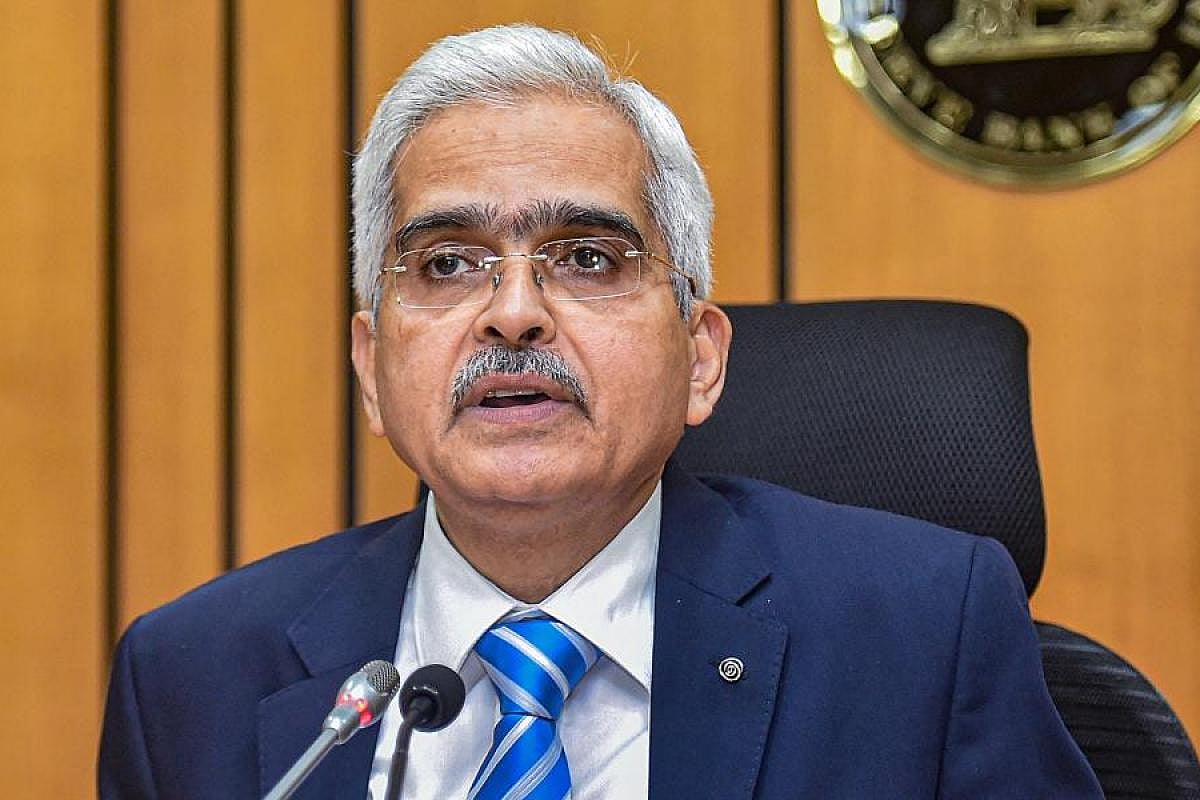In the wake of coronavirus outbreak, RBI Governor Shaktikanta Das announced slew of measures to keep the economy afloat during trying times.
From cutting repo rate to infusing liquidity in the market, he presented slew of monetary policies to tackle the economic crisis during the coronavirus outbreak which has put a halt on several businesses in India.
"India has locked down economic activity. Keeping finance flowing is the paramount objective of the RBI. India has locked down economic activity and financial activity is under severe stress," says Shaktikanta Das.
Well, the measures put in place by the RBI Governor was hailed by the industry experts. They say that the monetary policies by the RBI will help in solving the financial distress amid coronavirus outbreak. Experts see this as a "comprehensive package" which will boost the economy which has currently seen one of the biggest falls in recent times.

Here's what the industry experts had to say about RBI's rate cuts and other monetary policies amid coronavirus outbreak;
Abhimanyu Sofat, Head of Research, IIFL Securities
RBI announced bold set of measures amounting to ~3.2% of GDP to fight coronavirus will be well taken by the market. Measures of no asset classification downgrade for 3 months on term loans, working capital loans moratorium will be a relief for the industry.
Providing liquidity in investment grade corporate bonds will help in improving the currently stalled credit markets. Additionally, CRR cut of 100 bp along with repo and reverse repo cuts are likely to help induce additional liquidity. We had hoped for any additional liquidity window for NBFCs & MFs which hopefully with the possible backstop from the government RBI may be able to provide in the future.
Chandrajit Banerjee, Director General, CII
The decision to reduce the repo rate by 75 basis points by advancing the meeting of the monetary policy committee with a host of other measures to boost liquidity will address the financial stress in the system on account of the COVID-19 outbreak and the consequent lockdown. The substantial reduction in the CRR will help banks to reduce their lending rates and aid monetary transmission.
The increase in the corridor between the repo and reverse repo rates will discourage banks from parking money with the RBI.Given that the current lockdown is expected to have a negative impact on the cash flows of companies, the moratorium on repayments of term loans for a period of 3 months will help companies tide over this period.
However, CII would urge that this period be extended further in case the impact of the virus outbreak lasts longer than expected. The RBI governor did well to provide the assurance that all instruments are on the table to protect the economy and the financial system from either an excessive downturn or volatility.
Rajan Bendelkar, President, Western Region, Naredco and Director of Raunak Group
The RBI's much - needed liquidity infusion of Rs 3.74 Lakh crore into the economy comes as a big relief for the country, its markets and the people who are battling a COVID - 19 war in already prevailing recessionary conditions. The repo, reverse repo rate and CRR cuts would extend more lending powers to the banks. It's an attempt to ensure financial stability and confidence that the financial markets needed.
A moratorium of three months on repayment of loans and interest thereon, with a further assurance of not classifying such assets for downgrading, will give relief to the homebuyers and businesses. It will ease them from financial burdens and help them plan financial priorities better in this challenging time. The RBI has also assured that the banking system was sound and there was no need to be panicky about it.
But, all this has highlighted a fact that the real estate is a safe asset - class, as it is a physical one. This is evident when cash flows and liquidity have impacted all other asset classes severely.
Upasna Bhardwaj, Sr. Economist, Kotak Mahindra Bank
RBI, very correctly so, announced a comprehensive bazooka covering all aspects of the economy by taking measures system-wide both through liquidity, rates and regulatory forbearance (retail as well as for industry) and also targeted measures to manage the corporate bond markets.
The measures should help in tiding through the end of the year issues which many banks/institutions were fearing and will go a long way in cushioning the dislocations in various markets. We expect additional scope for 40-50bps of rate cut with any further easing and extension of measures depending on the nature of spread of COVID-19.
Deepthi Mary Mathew, Economist, Geojit Financial Services
It could be said that RBI has announced massive liquidity boosting measures including cuts in repo rate, reverse repo rate and CRR. The governor has also hinted about using unconventional methods if needed. In the present scenario, considering the weak sentiments in the economy, the effectiveness of monetary stimulus will be limited. Three month moratorium on loans is a welcome step.

Suman Chowdhury, President – Ratings, Acuité Ratings & Research Ltd
Acuité believes that the comprehensive measures announced by RBI to tackle the disruption triggered by Covid-19 goes beyond the rate cut of 75 bps in the repo rate. While the rate cut of 75 bps is indeed sharp and goes beyond the market expectations, the extent of the transmission by the banking system needs to be seen.
What is really significant is the massive liquidity infusion plan by RBI through TLTROs or targeted longer term refinancing operations, the 1% cut in the CRR and increase in marginal standing facility to 3% of SLR, all aggregating to around Rs. 3.74 Lakh Cr. With the liquidity already infused by RBI since February 2020, this will amount to a liquidity stimulus of 3.2% of GDP and address the funding needs in a disrupted financial market.
The TLTRO mechanism, in particular is likely to provide a lifeline to the bond markets as the banks can use these funds for investments in corporate bonds and commercial paper.In our opinion, the announcement of the moratorium measures was on expected lines and really appropriate in the current context of economic lockdown.
The 3-month moratorium on all term loan instalments along with deferment of interest on working capital for 3 months without any downward revision in the asset categorization for almost every lending institution in the country including banks and NBFCs will address the short term delinquency concerns in retail, MSME or corporate loans.
This will also be a significant relief for the NBFC and the MFI sector whose operations are likely to be very severely impacted in this lockdown period. The flexibility provided to banks to redefine and recalculate drawing power based on margin adjustments will also help in providing additional working capital facilities in the current scenario.

Niranjan Hiranandani – President- Assocham and NAREDCO
Fresh liquidity of Rs 3.74 lakh crores injected into the system by unleashing staunch arsenal support by strong fiscal measures timely announced. In the crucial time where Indian economy is battling the exponential contagion, a fresh liquidity pumped in the system will certainly help to mitigate the stressed cash flow and debt pressure in the economic system.
The RBI has rightly packaged the relief measures by amplifying all best instruments to act as an economic trouble shooter, salvaging Indian economic slump amidst world recession.In a much-awaited move, RBI has come up with measures to expand liquidity as also ease banking regulations; has cut rates as also announced moratorium of three months of EMIs on all outstanding loans.
Stakeholders in the Indian economy will heave a sigh of relief, as these moves reflect measures to take on the economic crisis caused by the COVID-19 pandemic. As the RBI Governor pointed out, these moves will enhance liquidity and ensure smooth functioning of financial institutions, while the EMI moratorium will ensure no impact on credit ratings on loan repayments.
The volume of measures carried out by the apex bank to infuse liquidity amounting to Rs 3.75 lakh crores back in the system is robust and applauded to uplift market sentiments. This fiscal relief package in addition to the FM's Rs 1.7lakh crore relief package ensures that the government is vigilant to retrieve nation out of economic pain and safeguard job loss.
He further emphasized that the reverse repo rate which has been cut by 90 basis point stands at 4 percent now. This should compel banks to lend more to all the adversely hit sectors.
Sudhakar Shanbhag, Chief Investment Officer, Kotak Mahindra Life Insurance Company Ltd
The market has been patiently waiting for our central banks action in light of what all global central banks have done till now post the COVID 19 scare. The MPC has come with really big measures including rate cuts, CRR cut, Floating rate long-term repos for investment grade corporate bonds and CPs, forbearance on loans in terms of moratoriums and deferral of interest payments, capital conservation buffer deferment by 6 months, Offshore NDF market relaxations. This seems to be a comprehensive package and very necessary at this stage when growth will be under pressure.
Anuj Khetan, Director, Vijay Khetan Group
"The struggling real estate sector and the home buyers trapped in COVID - 19 worries, have been relieved a bit with the RBI's measures. While the repo, reverse repo and CRR cuts would increase lending powers of the banks to the businesses, a suggested moratorium of home loan installments and interests thereon, which the banks should implement with immediate effect, will ease people from financial burdens.
It will support our business continuity plans, as well, because more liquidity will help the homebuyers schedule their buying plans in the short run.In this volatile environment, the real estate has been and will further be proved as the most secure investment.
The rental yield in the residential asset class will be between a 2-5% basis the size and location of the apartment and coupled with about 5-7% of the internal rate of return on capital appreciation over five years horizon. This will make the real estate investment a safe haven for investors with a total yield of 7 to 10% as returns. It will pave ways for positive arbitrage - investing in the residential real estate category, which has been almost non - existent for the last decade or so.
Amar Ambani, Senior President and Head of Research, YES Securities
The RBI policy has done everything in its power to help the Indian economy fight the slowdown, emanating from the Covid-19 crisis. The Central bank has effectively cut rates in the system by over 100 basis points, if one were to consider the combined benefit of the repo cut, sharp reverse repo cut, easing of CRR requirement, reduced need of daily CRR balance and MSF facility. This potent combination will result in immediate monetary transmission of these measures.
While new demand for credit will likely remain tepid, this offers a large sentiment boost, at the very least. Existing borrowers certainly get a big relief in the form of moratorium in term loans and their working capital payments. The Central bank also announced LTROs and banks are to use the proceeds, to participate in the corporate bond market, thus helping ease liquidity and lowering yields.
All-in-all, the liquidity injected in the system would be to the tune of $50bn. Among other steps, banks are now being allowed to participate in NDF market, a long-standing demand, that will help tide over the currency volatility somewhat. The most important statement in the policy speech, was the assurance that the RBI will remain vigilant and do whatever is necessary, in future as well, to revive growth.
Full marks to the RBI Governor for these commendable and decisive steps. While the stock market erased its gains post the policy announcement, I would imagine that expectations were already built-in, over the past 3 days; and I would view the slide as profit booking and not a negative reaction to the measures announced.











